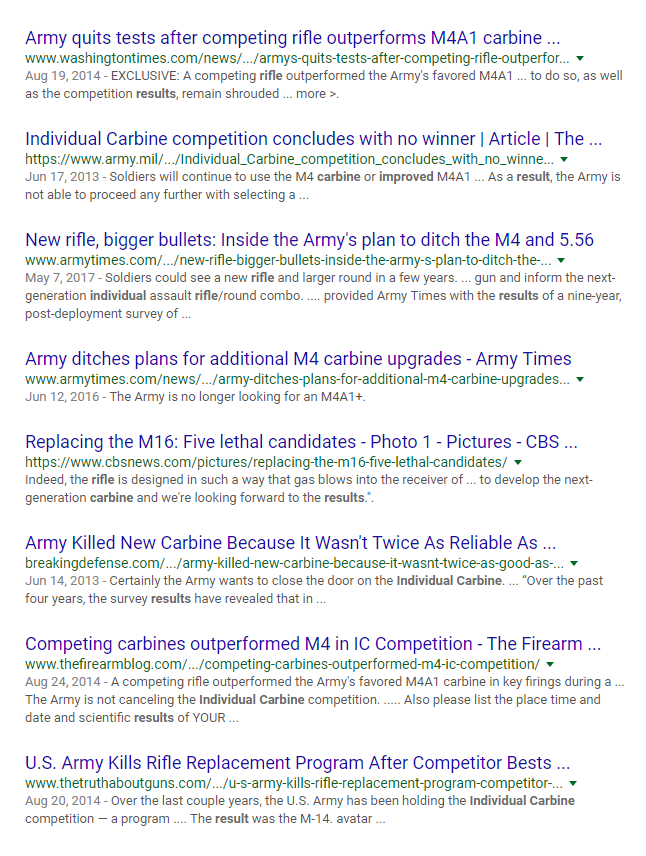We have just seen the cancellation of the Interim Combat Service Rifle, which gives me a good springboard to talk about marketing. Specifically, we will be discussing a kind of undercover word-of-mouth marketing that I’ve encountered a number of times over the years.
Program cancellations like that of ICSR can be disheartening for companies looking to benefit from their outcomes, but they can also present opportunities for further product marketing. To exploit this opportunity, many companies conduct what I will call “vulture marketeering”, which is an information campaign conducted at low levels, with the goal of favorably positioning a company’s products by leveraging a program’s cancellation to spread positive rumors. To do this, the company creates a simple but believable narrative about how their product was so superior that it was deemed dangerous to the interests of the program’s officers, and therefore the program was summarily shut down, lest it not turn out the way those officers had planned. To conduct a vulture marketing campaign, a company representative only has to follow five steps:
- Develop the narrative.
- Find someone relatively low on the totem pole (like a prolific forum poster) who is credulous.
- Make them feel important by telling them you’ll give them special information that only they can know.
- Feed them the narrative about the “real” reason the program was cancelled.
- Don’t name drop your company’s products as the reason the program was cancelled, just knowingly suggest they can figure it out.
In practice, a company representative conducting such a campaign might tell their target something like this: “You know, I really shouldn’t say this, but I trust you. They only killed the program because one of the contestants was performing so far ahead of the others. The brass got spooked, and decided to pull the plug. I can’t tell you whose entry it was, of course, but with a little digging I bet you can figure it out.”
Such a narrative is immediately believable. It’s human nature to try to quash those that seem too dangerous because they are rising too quickly. The narrative also positions the focus not on the company and its products, but on the Army’s supposed malfeasance, increasing trust in its veracity. Namedropping the company’s product as the leading horse is unnecessary, so long as the other person has been primed and is already thinking about it. They will immediately connect the dots, and – feeling extremely special and clever – run off to tell whomever they can about it.
Even better, a narrative like this is extremely difficult for anyone else to disprove, as well. Anyone with intimate knowledge of all those involved in the program and their motivations is extremely unlikely to be talking about it, and any other informed persons will not have enough information to fight a narrative that feels so naturally plausible. Eventually, the idea spreads through the rumor mill, and the company that started it reaps the benefits of an improved reputation.
With ICSR, we are already seeing the same thing. Despite the program being little more than a month old at the time of its cancellation (which occurred just a week after submissions were due), some are claiming that one contestant or another was performing so much better than the others that it killed the whole program. It’s obvious that the brass would do this, you know, to prevent Excalibur, the Rifle of Legend from wreaking havoc on military procurement, or something. With a little careful thought, such a narrative should seem ludicrous on the face of it, but what makes this tactic useful is its inherent believability, despite all logic.
Ultimately, rumors can only have a limited impact, and the vulture marketing strategy is, for the purposes of this post, a curiosity only. It is doubtful that by itself such a campaign could so strongly influence decisions as to substantially benefit a company monetarily. However, it costs nothing to do so, and when combined with a broader influence campaign can reinforce an already strong reputation. Further, the sort of feelings behind these rumors are probably genuine, and in that way they may actually be honest expressions of how the company itself perceived the program’s outcome. After all, being in a competition to find the best, only for it to be called off prematurely, certainly feels like being cheated by those running things.
 Your Privacy Choices
Your Privacy Choices

